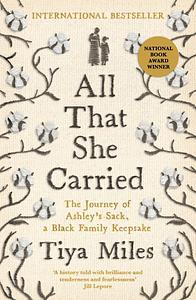Take a photo of a barcode or cover
652 reviews for:
All That She Carried: The Journey of Ashley's Sack, a Black Family Keepsake
Tiya Miles
652 reviews for:
All That She Carried: The Journey of Ashley's Sack, a Black Family Keepsake
Tiya Miles
Incredible achievement. While the writing feels like a history book at times, Miles weaves this story with skill, grace, and love. I have a new appreciation for not only what unfree families lost, but also how they loved. Miles' call to us is powerful: "[W]e hold a bag both empty and full, around which our many hands find the space for joining."
informative
reflective
medium-paced
I saw this piece when it was still in DC. It’s a truly phenomenal object that speaks to many different stories. Tiya Miles has examined it a variety of ways that have illuminated the lives and stories of Black women from 1850 through the 1930’s when Ruth Middleton embroidered the sack. I highly recommend this book!
I misunderstood what this would be. Lesson learned.
challenging
dark
emotional
hopeful
informative
sad
A very difficult read, but necessary. Miles takes a single artifact, an antique sack, and finds a historical record of unfree Black women (and men) inside. It’s both fascinating and absolutely heartbreaking.
Graphic: Child abuse, Child death, Confinement, Death, Physical abuse, Racism, Rape, Sexual assault, Slavery, Torture, Violence, Trafficking, Grief, Death of parent, Murder, Colonisation
Really well-researched and well-written, just contained so much tangential information that was interesting and vaguely related (i.e. the history of the pecan coming to the US and its use in the US) but left me feeling a little confused/off track
Very moving to think about this artifact and the love between mother and daughter that it represents. I think the writing became a bit repetitive, especially due to the lack of new information Miles was able to turn up in her research. Overall a good outline for how to reconstruct histories of underrepresented groups, especially Black women.
medium-paced
challenging
emotional
hopeful
informative
inspiring
sad
tense
medium-paced
There are no scare tactics here. Stories are told from a place of care, trauma and socially informed space and assumes intelligence and sensitivity throughout.
As we ask educators to be braver and do right by all children, I hope those who teach 12 years and up catch on to this one.
I wish that all LYS (Local Yarn Shops), craft community spaces and materials exchanges carried this book.
Anyone who touches cloth, textiles and other humans could use these thoughtful, caring and difficult reminders.
As we ask educators to be braver and do right by all children, I hope those who teach 12 years and up catch on to this one.
I wish that all LYS (Local Yarn Shops), craft community spaces and materials exchanges carried this book.
Anyone who touches cloth, textiles and other humans could use these thoughtful, caring and difficult reminders.
Graphic: Child abuse, Racism, Rape, Colonisation, War
Tiya Miles handles the more difficult topics off page but never shies away from the truth.


